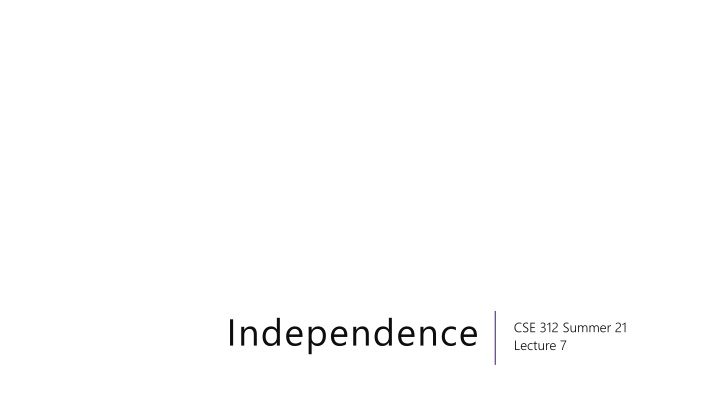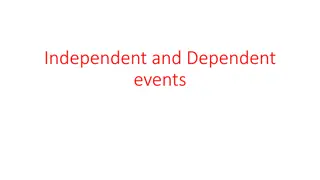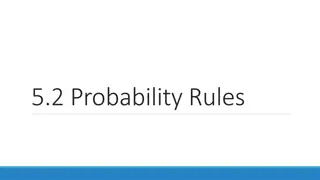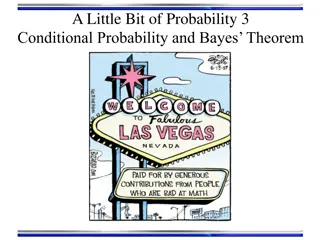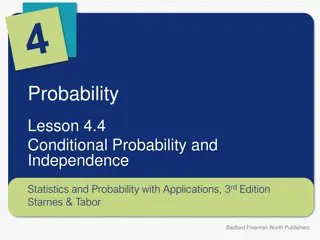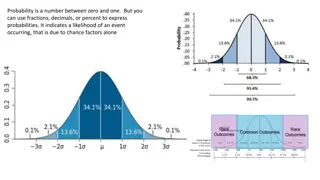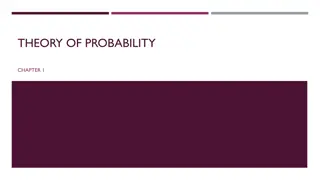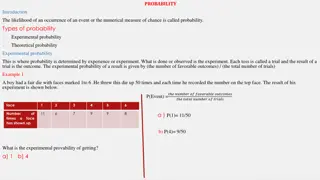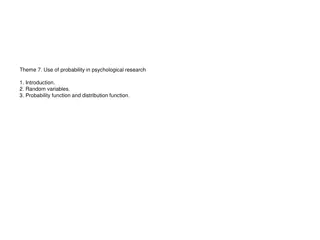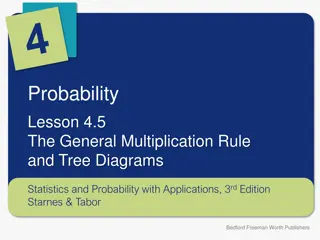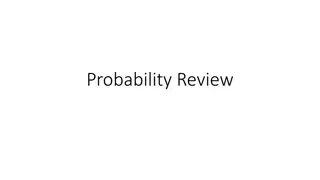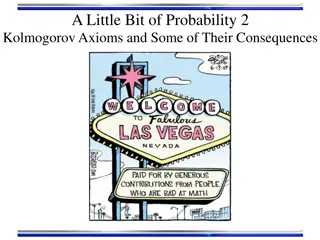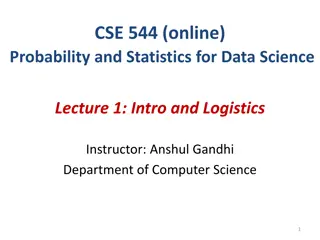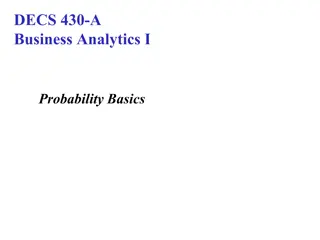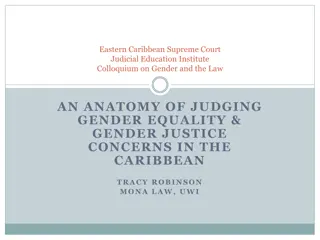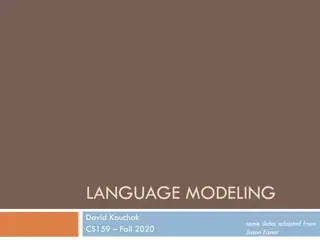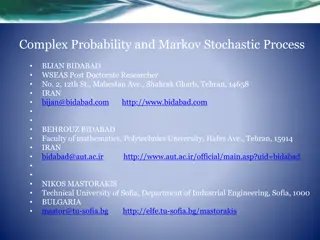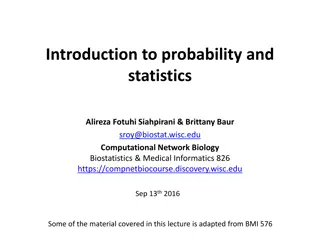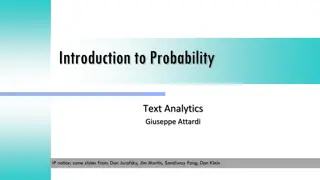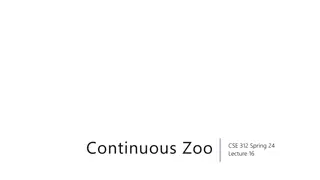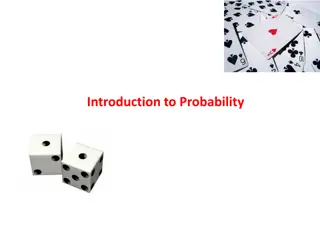Chain Rule and Independence in Probability Theory
In this lecture, we delve into the concepts of the chain rule and independence in probability theory. We explore conditional probabilities, event restrictions, and sample space changes. Through examples like shuffling a deck of cards and detecting spam emails, we illustrate how these principles apply in real-world scenarios. Gain a deeper understanding of how to calculate probabilities and determine independence in complex systems.
Download Presentation

Please find below an Image/Link to download the presentation.
The content on the website is provided AS IS for your information and personal use only. It may not be sold, licensed, or shared on other websites without obtaining consent from the author.If you encounter any issues during the download, it is possible that the publisher has removed the file from their server.
You are allowed to download the files provided on this website for personal or commercial use, subject to the condition that they are used lawfully. All files are the property of their respective owners.
The content on the website is provided AS IS for your information and personal use only. It may not be sold, licensed, or shared on other websites without obtaining consent from the author.
E N D
Presentation Transcript
Independence CSE 312 Summer 21 Lecture 7
Announcements Problem Set 1 grades have been released. Please submit a regrade request (if needed) on Gradescope within a week. Problem Set 2 due tomorrow. Review Summary 1 due on Friday. Real World Mini-project out tonight. Problem Set 3 out tomorrow.
Announcements Problem Set 3 out tomorrow evening. Problem Set 3 includes a programming project using Bayes rule to do some machine learning detecting whether emails are spam or ham (legitimate emails). Longer than the programming on Problem Set1 please get started early! Extra resources with common difficulties on the programming project will be linked in the Problem Set 3 pdf.
Today Chain Rule Independence Conditional Independence
A word of caution from last lecture I often see students write things like ([? ?] ?) This is not a thing. You probably want (?| ? ? ) ?|? isn t an event it s describing an event and the sample space. So, you can t ask for the probability of that conditioned on something else. and telling you to restrict
Chain Rule We defined conditional probability as: ? ? = ? ? ? Which means ? ? = (?|?) (?) Chain Rule ?1 ?2 ?? = ???1 ?? 1 ?? 1?1 ?? 2 ?2?1 (?1)
Chain Rule Example Shuffle a standard deck of 52 cards (so every ordering is equally likely). Let ? be the event The top card is a K Let ? be the event the second card is a Q Let ? be the event the third card is an A What is (? ? ?)? Use the chain rule! ? ? ? (?|? ?) 1 52 1 51 1 50
Definition of Independence We ve calculated conditional probabilities. Sometimes conditioning getting some partial information about the outcome and restricting the sample space doesn t change the probability. We already saw an example like this
Revisiting Conditioning Practice Red die 6 conditioned on sum 7 1/6 Red die 6 conditioned on sum 9 1/4 Sum 7 conditioned on red die 6 1/6 D2=1 D2=2 D2=3 D2=4 D2=5 D2=6 (1,1) (1,2) (1,3) (2,1) (2,2) (2,3) (3,1) (3,2) (3,3) (4,1) (4,2) (4,3) (5,1) (5,2) (5,3) (6,1) (6,2) (6,3) D1=1 D1=2 D1=3 D1=4 D1=5 D1=6 (1,4) (2,4) (3,4) (4,4) (5,4) (6,4) (1,5) (2,5) (3,5) (4,5) (5,5) (6,5) (1.6) (2,6) (3,6) (4,6) (5,6) (6,6) Red die 6 has probability 1/6 before or after conditioning on sum 7.
Independence Independence Two events ?,? are (statistically) independent if ? ? = ? (?) You ll sometimes see this called statistical independence to emphasize that we re talking about probabilities (not, say, physical interactions). If ?,? both have non-zero probability then ? ? = (?) (?) ? ? = (?) ? ? = (?)
Examples We flip a fair coin three times. Each flip is independent. (both in the statistical independence sense and in the doesn t affect the next one sense). Is ? = {???} independent of ? = at most two heads ? Are ? = the first flip is heads and ? = the second flip is tails independent? Fill out the poll everywhere so Kushal knows how long to explain Go to pollev.com/cse312su21
Examples Is ? = {???} independent of ? = at most two heads ? ? ? = 0(can t have all three heads and at most two heads). ? =1 8 , ? =7 8; ? ? ? (?). Are ? = the first flip is heads and ? = the second flip is tails independent? ? ? =2 8 (uniform measure, 2 of 8 outcomes meet both ? and ?) 2, ? =1 ? =1 2; 2 8=1 2 1 2. These are independent!
Hey Wait I said the flips are independent why aren t ?,? independent? the flips are independent means any event <the first flip is blah> is independent of <the second flip is blah> But if you have an event that involves both flip one and two that might not be independent of an event involving flip one or two.
Mutual Exclusion and Independence Two of these statements are true, one is false. Explain to each other which ones are true and find a counter-example to the false one. 1. If ?,? both have nonzero probability and they are mutually exclusive, then they cannot be independent. 2. If ? has zero probability, then ?,? are independent (for any ?). 3. If two events are independent, then at least one has nonzero probability. Fill out the poll everywhere so Kushal knows how long to explain Go to pollev.com/cse312su21
Mutual Exclusion and Independence Two of these statements are true, one is false. Explain to each other which ones are true and find a counter-example to the false one. 1. If ?,? both have nonzero probability and they are mutually exclusive, then they cannot be independent. 2. If ? has zero probability, then ?,? are independent (for any ?). 3. If two events are independent, then at least one has nonzero probability.
Conditional Independence We say ? and ? are conditionally independent on ? if ? ? ? = ? ? (?|?) i.e. if you condition on ?, they are independent. Conditional Independence Two events ?,? are independent conditioned on ? if ? 0 and ? ? ? = ? ? (? ?)
Conditional Independence Example You have two coins. Coin ? is fair, coin ? comes up heads with probability 0.85. You will roll a (fair) die, if the result is odd flip coin ? twice (independently); if the result is even flip coin ? twice (independently) Let ?1 be the event the first flip is heads , ?2 be the event the second flip is heads , ? be the event the die was odd Are ?1 and ?2 independent? Are they independent conditioned on ??
(Unconditioned) Independence ?1 = ? ?1? + ? (?1| ?) =1 2 0.85 = .675 ?2 = .675 (the same formula works) ?1 ?2 =.6752= .455625 ?1 ?2 = ? ?1 ?2? + ? (?1 ?2| ?) =1 Those aren t the same! They re not independent! 2 1 2+1 2 1 4+1 2 .852= .48625 Intuition: seeing a head gives you information Intuition: seeing a head gives you information information that it s more likely you got the biased coin and so the next head is more likely. the biased coin and so the next head is more likely. information that it s more likely you got
Conditional Independence ?1? = 1/2 ?2? = 1/2 ?1 ?2? =1 2 1 2= 1/4 ?1? ?2? = (?1 ?2|?) Yes! ?1 and ?2 are conditionally independent, conditioned on ?.
Takeaway Read a problem carefully when we say these steps are independent of each other about some part of a sequential process, it s usually conditioned on all prior steps, these steps are conditionally independent of each other. Those conditional steps are usually dependent (without conditioning) because they might give you information about which branch you took.
